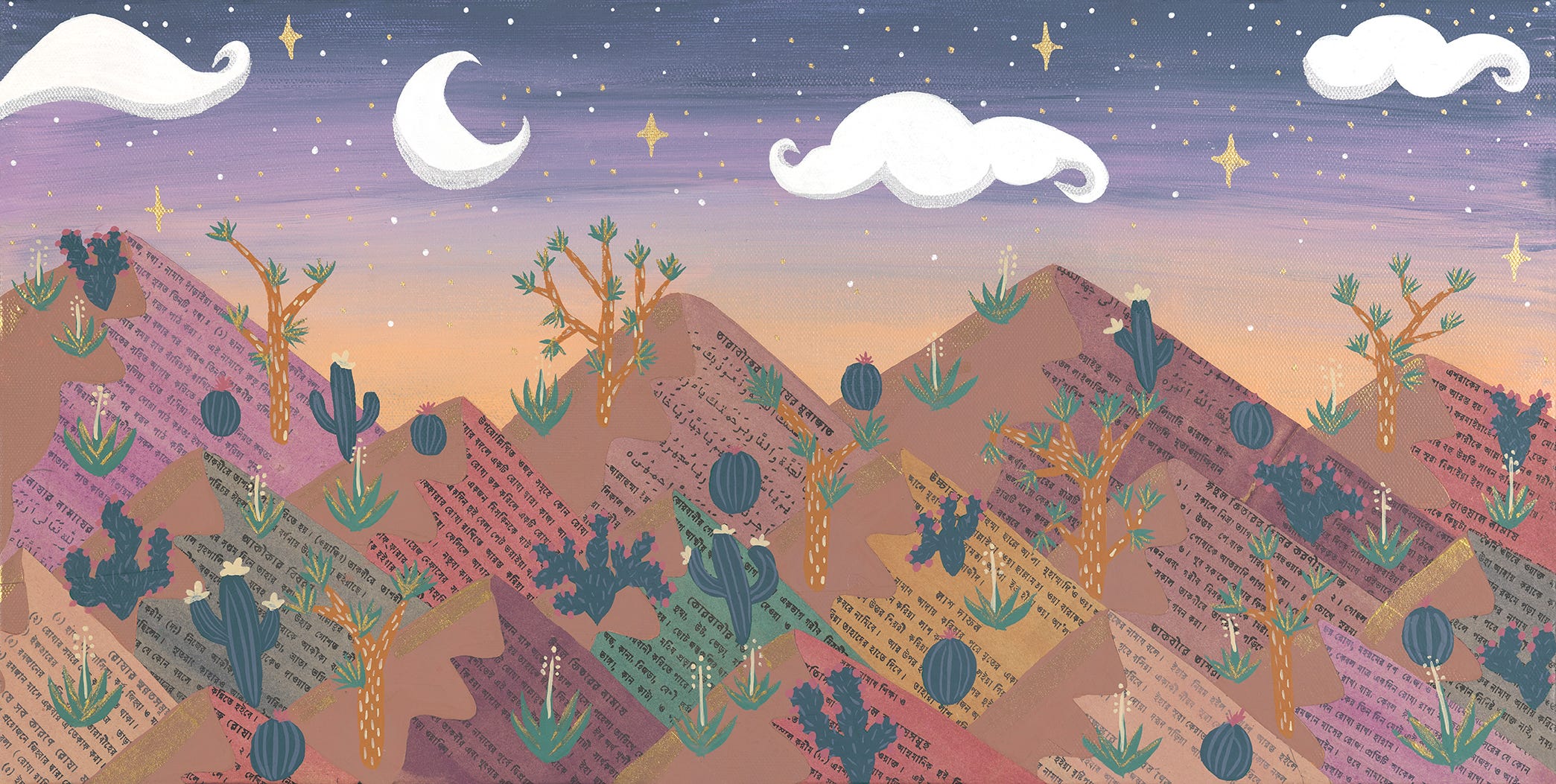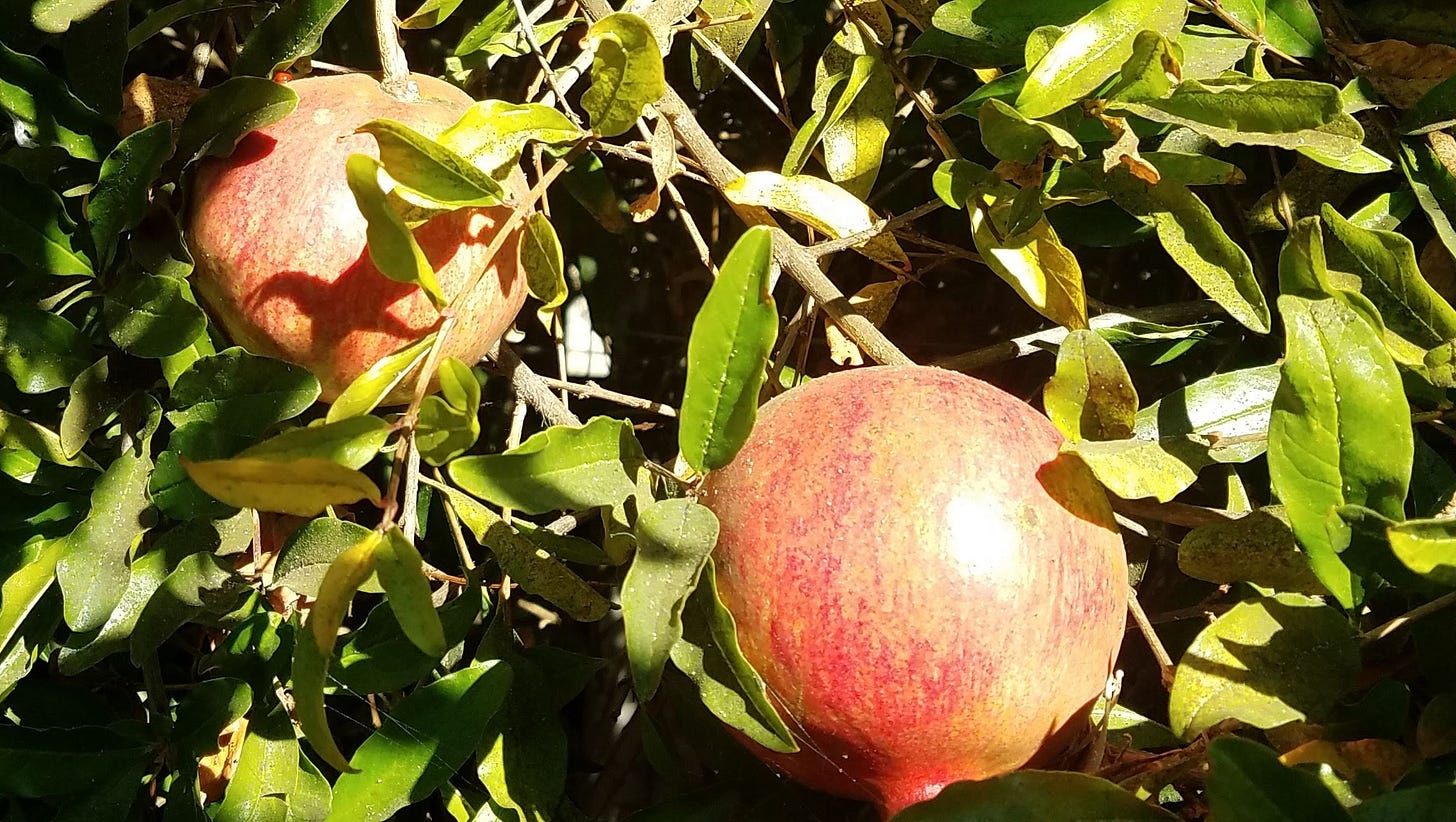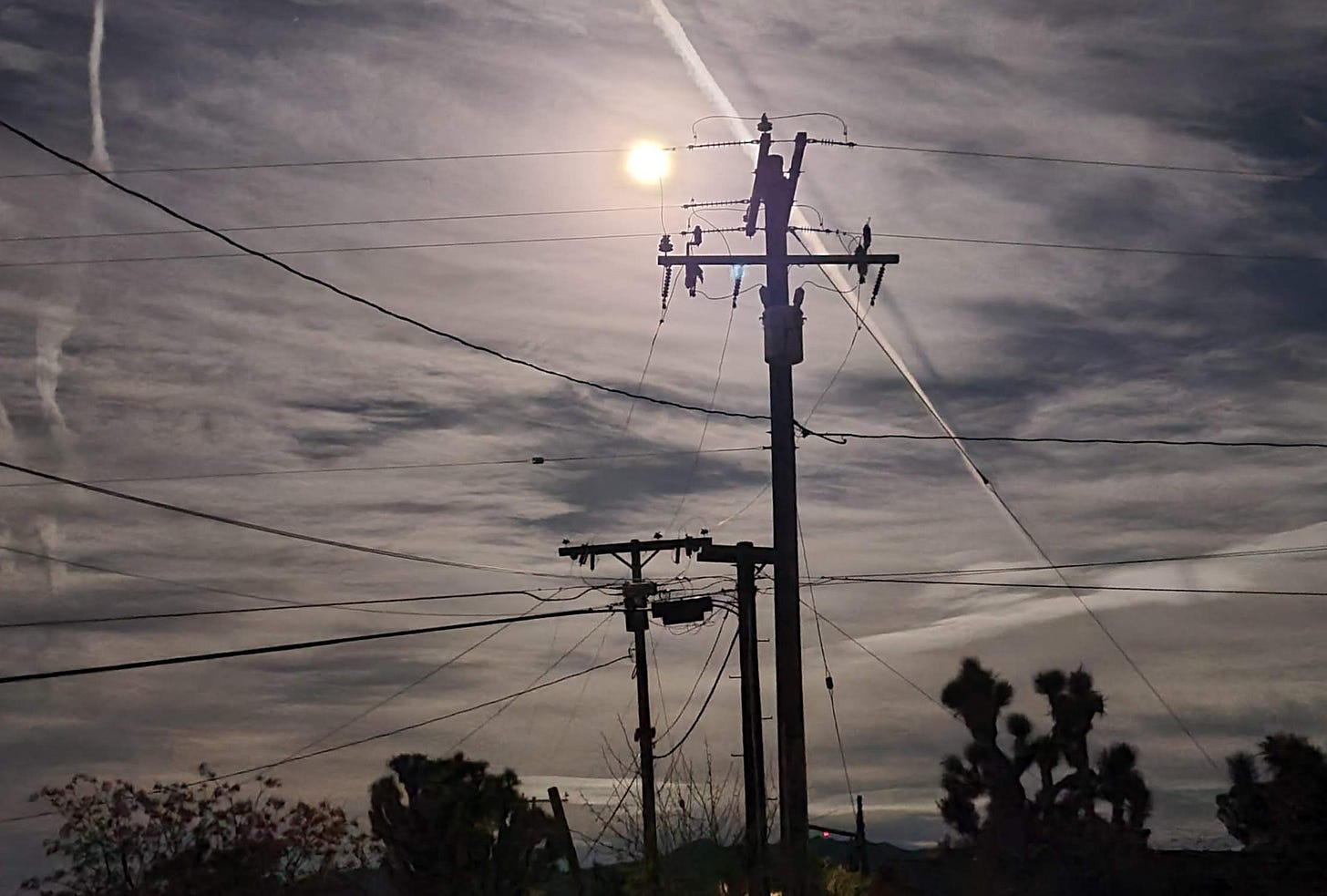Grasping At This Planet
A meditation on seeking out hope in spite of living through the live-streaming of an international tragedy
Welcome to my Substack #25. I have been at a loss for words since the war began but I’m back, for now. Soundtrack for this post: Free, Free
Today, is the 10th day of Ramadan, and I’m watching as five men dressed in bright orange vests figure out how to chop down the tree in front of my father’s house. It’s not technically in his yard, but on the sidewalk strip owned by the city so we couldn’t trim it on our own. I couldn’t tell you what kind of tree it is, but that it now grazes the electric lines overhead, the roots have broken the sprinkler pipes, and during heavy rains we move our cars from under it just in case a branch might fall. I don’t know the species but the leaves are colored dusty sage the size of quarter and the bark peels off in multicolored sheets. The men in orange vests come with a bucket truck, skid steer, and trump grinder, and stand around with arms crossed looking up at the tree for a long while. It was I, the teenaged tree hugger, who convinced my parents we should plant trees in the yard of our 1970s California ranch house. Mom planted the tree, when it was just a sapling. The stray black cat Casper would climb her branches. The mockingbirds would chirp in the sound of car alarms in the middle of the night hiding in her leaves. The men in the orange vests chainsaw limbs of the tree section by section – leaves falling, trunks thumping, vibrating the ground in ripples. Trees are such a sign of life, it’s hard not to place symbolism on the tree being cut during the holy month of fasting. It is hard not to think of the stumps of olive trees ravaged across Palestine.
The perfect pomegranate with almost black red seeds like polished garnet, plucked straight from the tree in my dad’s backyard. The size of a softball, with a firm outer skin mottled bright fuchsia and ready to burst through with all the juices. I have learned the best way to crack them open is submerged in a bowl full of water, deseeding so all the pith floats to top. Once drained, the seeds can be eaten by the spoon full. But this perfect pomegranate I am holding is too delectable to submerge. Instead, I score the skin in four, crack open the fruit on my lap in a bowl carefully pulling wedges apart and let the red nectar stain my fingers and drip down my wrists. I pop one seed off at a time, eating one seed at a time. It is delicious, and so sweet, and so perfect. A meditation on tasting and fruiting. The first year of the pandemic, after I trimmed the overgrown pomegranate tree, there were no flowers or fruits that season. I was afraid I had shocked the tree into remission, having learned to trim the tree from a YouTube tutorial. The year after, the fruits was few and sour. But this year, all the pomegranates grew big and sweet, hanging heavy on the branches.
I think about how I was a teenager when I convinced my mom to plant fruit trees in their yard. We had never lived some place long enough before to plant something as significant as a tree. Every year of my childhood we moved houses – I was always living out of boxes as my Dad struggled to find the next best job. After we stayed put for longer than a couple of years, the trees were planted. First a guava tree from a Vietnamese neighbor, and then another. Now, our yard fruits apples, limes, pomegranates, persimmons, guavas and avocados. Now, these trees are decades years old. And I think about the olive trees in Gaza, and how they are hundreds of years old, and how callously they are being destroyed. And I wonder who convinced their Ammu to plant those trees.
On Instagram, at the beginning of the genocide, Bisan told us to protest, and speak out, but she also told us to experience joy. To live a life so big outside of Gaza, that she couldn’t inside of inside of Gaza. I think a lot about this joy, this rebellious love that embodies our resilience. I remember, I used to write poems about it with frequency. But I don’t know if I feel it anymore in my soul like I used to. It’s hard to when you are livestreaming a genocide on your phone. If life is so fragile, how can life be so callous?
I am fasting again this Ramadan after a few years of not because how could I watch starving people on my phone and eat? I try to find joy in the rituals of Ramadan – in the sipping of water at iftar, in writing spiritual poems, and in praying shoulder to shoulder with my friends. After a couple days, my upper back progressively aches and a spot on my spine becomes tender to touch. I have to break my fast at 2pm on day 8, because the pain is unbearable and I’m scared of herniating a disk from the dehydration. By the time I go to my chiropractor a couple days later, the pain has fully disappeared. I feel shamed by how my body betrayed me. How dare I feel back pains after a week when Palestinians babies are starving to death.
I have lost my ability to art, to write, to poem. The only thing that can summon myself to paint is keffiyeh’s on megaphones, over and over and over again. It’s not quite joy, but a way to channel my rage. And that is a different kind of happiness, I guess.
“If I must die you must live to tell my story, to sell my things, to buy a piece of cloth and some strings, (make it white with a long tail) so that a child, somewhere in Gaza while looking heaven in the eye awaiting his dad who left in a blaze— and bid no one farewell not even to his flesh not even to himself— sees the kite, my kite you made, flying up above and thinks for a moment an angel is there bringing back love. If I must die let it bring hope let it be a tale.” – Refaat Alareer
Do you know what the scent of creosote smells like in the rain? It’s both musky and clean, and smells like the fresh desert. There’s something deeply comforting and delightful about the smell. Smells more like home than home itself. I wonder how the plants in Palestine smell after the rain.
Look at the moon. She glows. She shines down on us everywhere, past, present, and future. My moon is their moon too.
Tumbleweed in Santa Ana winds are hilarious. Comically similar to a Looney Tunes cartoon. Do they have tumbleweeds bringing them joy in their desert winds?
Sitting in hot tubs with soul friends at night, the world spinning while looking for shooting stars. Telling secrets and dreams and manifesting a new way of being.
Sunsets, but the pink ones, after a cloudy sky. The kind you only find in when looking at the sunset over the ocean. I wonder if then, beach sunsets in Santa Monica are anything like the beach sunsets from Gaza. Are we watching the same sunsets.
For the past few months, I’ve been digging through archives and searching through the internet for radical South Asian American moments in Los Angeles. It’s a localized offshoot of the my radical history timeline workshop from 2010. Diggin in the archives is like a scavenger hunt or a mystery to dig through obscure search words and history to find a something thrilling. Our histories are so often marginalized – because by erasing our past, ‘they’ can stifle our power from imagining a different future. It’s the same kind of joy I get from rescuing oriental items from thrift stores or finding a South Asian derived street in America. Maybe this little project will be how I can give a little hope to the next generation. [Read my essay on the LA South Asian Radical History Map & Driving Tour here and map here.]
The feeling of going to a protest by yourself and knowing you will bump into all your friends there. The type of friends who you don’t have to see frequently to know they will catch you when you fall, and you will catch them when they fall too. The friends you will fight with.
Michael Latt texted me the night of our event – he had to leave early because he was flying to Japan for a vacation with his new fiancée. He was so excited. I had been looking for him after the event to take a congratulatory selfie and a hug him goodbye. He texted we would debrief when he returned. I didn’t know that was the last time I would see him. I had known him only casually in community, but he pulled me into a project where we worked intensely together to organize the L.A. premiere of A Town Called Victoria. He was kind, weird, eager, had bad dad jokes, and was compassionate. At the event my sisters and I teased him about an elder millennial reference he didn’t get – and I remembered thinking that he was only 33 years old, and how he had his whole life ahead of. He was killed tragically just days after returning from Japan. I can’t help but think that us getting to work so closely together the weeks before he died meant something. It had to have. The company he founded was called “Lead with Love” and he embodied it in his activism in every kind of way. I wonder now how I can lead with love despite living in a world so cruel to senselessly take him away.
“When you try to protect yourself from disappointment – you rob yourself of joy now, diminish your faith with doubt and you don’t save yourself from disappointment when it comes. Get your hopes up. Having hope is a sign of faith.” - @practicalmuslim
It is now Ramadan, and I’m desperately scrambling for hope. Ramadan is a time of deep reflection and spirituality and the only way I could connect with these feelings was with poetry. So every Ramadan since my mother died, I wrote a poem a day. It started out as a discipline, with collective accountability from the community of misfit Muslims I collected. I know now that writing poems daily for Ramadan saved me, gave me hope when I needed it most. Through poetry I found a way to articulate myself to myself again to have faith again. I’m so thrilled I get to share these poems with you in my new poetry book Grasping at This Planet Just to Believe out with Writ Large Press this April. Reading the poems reminds me of how in love and alive with my community I was and how passionate for faith I once was. It’s a good touch point – and I hope you will feel the same reading them.
Past the halfway point of Ramadan and I have lost the urgency and discipline of writing a poem a day for Ramadan. I can’t tell if it’s because I’ve healed from the grief or if I’m a little lost in the listlessness of this world.
It is a gift to be alive. It is my right to live it with joy. It is my purpose to speak out in this life against the injustice.

Aunties w/ Deadly Stare: B-Side now showing at Woodcat Cafe in Echo Park Did you look at the moon outside last night? She is beautiful and joyous, still. Despite and in spite this world. It’s Ramadan - go write a poem about it.






Thank you for this post. Just bought your book! Congrats!!